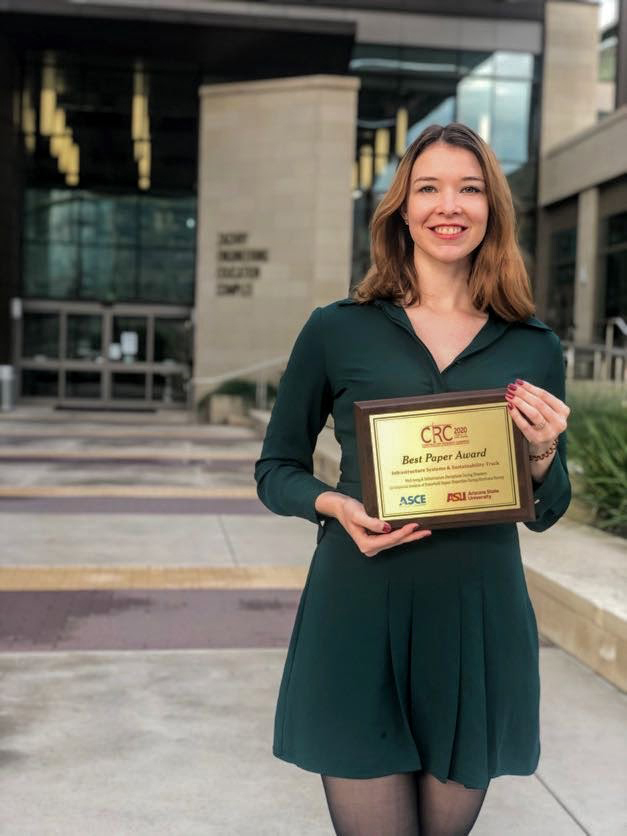
Disaster events from hurricanes, earthquakes, wildfires and even the COVID-19 pandemic can cause disruptions in infrastructure services, and the impact on the social fabric of communities is inevitable.
Determining how to decrease these disruptions by targeting the most significant vulnerabilities and needs is key.
For the last year, Jennifer Dargin, a doctoral student in the Zachry Department of Civil and Environmental Engineering at Texas A&M University, has been researching how to integrate social inequality considerations into infrastructure resilience analysis by examining the interactions between human and infrastructure system networks.
Dargin's paper on this topic received the Best Paper Award in the Infrastructure Systems and Sustainability Track of the 2020 American Society of Civil Engineers Construction Research Congress, the largest and most important construction research conference in North America.
“The distinguishing point of this paper and the research we are working on as a whole at our lab is highly interdisciplinary, converging engineering, social sciences, and fields of hazards and disaster to examine social inequalities in infrastructure resilience," she said. "The findings present novel insights to understanding the role of infrastructure resilience in household well-being, as well as inequalities in well-being impacts across various sub-populations. The research approach and findings enable a paradigm shift toward a more human-centric approach to infrastructure resilience.”
According to Dargin, the results specifically show that disruptions in transportation, solid waste, food and water infrastructure services resulted in more significant well-being impact disparities as compared to electricity and communication services. They also show households were more likely to feel helpless, have difficulty doing daily tasks and feeling distance from their community as a result of service disruptions.
"While working on this research, what strikes me most is the inherent complexities and dependencies of our infrastructure systems and why it is so important to understand these interactions to reduce risks and minimize their impacts on our communities," she said. "My research and the work in our lab (the Urban Resilience, Networks and Informatics Lab) highlight that infrastructure disruptions are much more than an engineering problem."
Current infrastructure resilience models can predict when a system will face failure, but they cannot predict or measure the social consequences of disruptions. Who suffers, for how long and why?
"Integrating social inequality considerations into infrastructure resilience is critical for addressing these questions and essential for building communities that are both sustainable in the long term and resilient in the face of future disasters," Dargin said. "A human-centric approach is the key to advancing our fundamental understanding of household-infrastructure service disruption."
Taking this approach will effectively reduce the risk disparity of vulnerable populations to service disruptions and integrate social equity into prioritization and planning of infrastructure.
Dargin’s work is a part of Dr. Ali Mostafavi’s National Science Foundation CAREER award, one of the most prestigious awards for up-and-coming researchers that provides funding to support promising integrated research and education.
Mostafavi, assistant professor in the department, hypothesizes that there is a disparity in the impact of risk and his research aims to increase the theoretical and empirical foundations in the interdisciplinary area of urban resilience research.
“Jennifer's work is highly interdisciplinary and is part of our NSF CAREER project, which aims to advance the fundamental understanding and modeling of social inequality aspects in infrastructure resilience assessments," he said.
The project uses machine learning, social sensing and complex networks simulation to analyze people's responses to infrastructure disruptions following disasters.
"Factors such as ethnicity and household income affect the amount of tolerance that a household can emotionally and mentally withhold when experiencing hardships due to service disruptions," Dargin said. "Using the correlation analysis, this study discovered disparities in well-being experience due to disruptions in infrastructure services, primarily among racial or ethnic groups.
"These events alone are a reminder of why this line of research is so critical and serves as greater motivation for me to keep working on these issues, which I continue to address in my ongoing research” she said.
Dargin and Mostafavi will investigate the influence of other factors such as preparedness, previous experience, expectations and social capital on the well-being impacts of infrastructure disruptions.